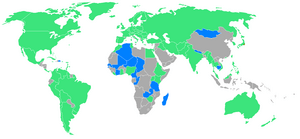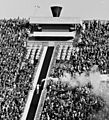1964 Summer Olympics facts for kids
The 1964 Summer Olympics were a huge international sports event. They were officially called the Games of the XVIII Olympiad. These games took place in Tokyo, Japan. They ran from October 10 to October 24, 1964. This was a very important moment for Japan. It was the first time the Olympics were held in Asia.
Contents
What Were the 1964 Tokyo Olympics?
The 1964 Summer Olympics were a major global sports festival. Athletes from many countries came together to compete. They showed off their skills in various sports. The games were a symbol of peace and friendship. They brought people from different cultures together.
Why Were the Tokyo Olympics Special?
These Olympics were special for several reasons. They were the first Olympic Games ever held in Asia. This was a big step for the continent. Japan had planned to host the 1940 Olympics, but they were cancelled due to World War II. So, 1964 was a chance for Tokyo to finally shine.
How Did Tokyo Prepare for the Games?
Tokyo underwent a massive transformation for the Olympics. The city built new roads and a fast train system. This train was called the Shinkansen, or "bullet train." Many new sports venues were also constructed. These included impressive stadiums and gymnasiums. The preparations helped modernize Tokyo.
Who Lit the Olympic Flame?
The Olympic flame was lit by a young man named Yoshinori Sakai. He was a university student. Sakai was born on August 6, 1945. This was the same day the atomic bomb fell on Hiroshima. Choosing him to light the flame sent a powerful message of peace. It showed the world that Japan had recovered and was looking towards the future.
What Sports Were Played in 1964?
The 1964 Summer Olympics featured many exciting sports. Athletes competed in events like track and field, swimming, gymnastics, and wrestling. Two new sports were introduced at these games. These were judo and volleyball.
Judo's Olympic Debut
Judo is a Japanese martial art. It became an official Olympic sport in 1964. This was a proud moment for Japan. The judo competitions were held at the Nippon Budokan. This famous arena was built specifically for the games.
Volleyball Joins the Games
Volleyball also made its first appearance as an Olympic sport. Both men's and women's teams competed. The Soviet Union won the gold medal in men's volleyball. Japan won the gold medal in women's volleyball. This was a huge victory for the host country.
Who Were Some Famous Athletes?
Many athletes became legends at the 1964 Olympics. Their performances inspired people around the world.
Abebe Bikila's Marathon Win
Abebe Bikila from Ethiopia won the marathon for the second time. He had also won in 1960. This made him the first person to win two Olympic marathons. He ran the race barefoot in 1960, but wore shoes in 1964. His victory was truly remarkable.
Other Notable Performances
American swimmer Don Schollander won four gold medals. He was the first swimmer to achieve this feat. Larisa Latynina, a gymnast from the Soviet Union, won six medals. This added to her already impressive Olympic medal count. She became one of the most decorated Olympians ever.
What Was the Impact of the 1964 Games?
The 1964 Tokyo Olympics had a lasting impact on Japan and the world. They showed Japan's recovery after the war. They also highlighted Japan's advanced technology and culture.
Global Connections and Peace
The games helped Japan reconnect with the world. They promoted understanding between different nations. Despite the Cold War, the Olympics offered a chance for countries to compete peacefully. It was a time when sports brought people together.
Technological Advancements
The 1964 Olympics were also known for their use of new technology. They were the first Olympics to be broadcast live internationally using satellites. This meant people around the world could watch the events as they happened. It was a big step forward for television.
Images for kids
-
Marathon winner Abebe Bikila of Ethiopia
Related pages
| Summer Games: 1896, 1900, 1904, 1906, 1908, 1912, (1916), 1920, 1924, 1928, 1932, 1936, (1940), (1944), 1948, 1952, 1956, 1960, 1964, 1968, 1972, 1976, 1980, 1984, 1988, 1992, 1996, 2000, 2004, 2008, 2012, 2016, 2020, 2024, 2028 |
||
| Winter Games: 1924, 1928, 1932, 1936, (1940), (1944), 1948, 1952, 1956, 1960, 1964, 1968, 1972, 1976, 1980, 1984, 1988, 1992, 1994, 1998, 2002, 2006, 2010, 2014, 2018, 2022 | ||
| Athens 2004 — Turin 2006 — Beijing 2008 — Vancouver 2010 — London 2012 — Sochi 2014 — Rio 2016 — Pyeongchang 2018 — Tokyo 2020 Games in italics will be held in the future, and those in (brackets) were cancelled because of war. See also: Ancient Olympic Games |
||
| Summer Games: 2010, 2014, 2018 | ||
| Winter Games: 2012, 2016, 2020 |
||
| Singapore 2010 — Innsbruck 2012 — Nanjing 2014 |
||
See also
 In Spanish: Juegos Olímpicos de Tokio 1964 para niños
In Spanish: Juegos Olímpicos de Tokio 1964 para niños








